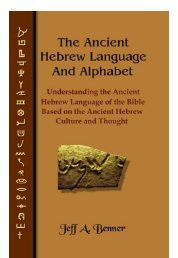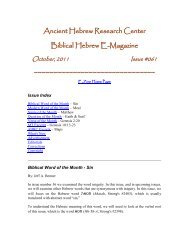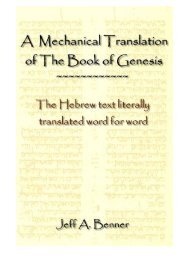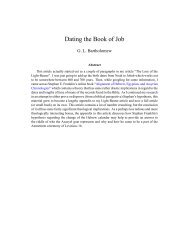My Name Forever - Ancient Hebrew Research Center
My Name Forever - Ancient Hebrew Research Center
My Name Forever - Ancient Hebrew Research Center
Create successful ePaper yourself
Turn your PDF publications into a flip-book with our unique Google optimized e-Paper software.
<strong>My</strong> <strong>Name</strong> <strong>Forever</strong> 3<br />
Shem Tov's <strong>Hebrew</strong> Matthew 15:1-9 Then the sages and the Pharisees came to Yeshua<br />
and said to him, “Why do your disciples transgress the reforms of antiquity in that they<br />
do not wash their hands before eating?” But Yeshua said to them, “And why do you<br />
transgress the words of Elohim for the sake of your reforms?... You despise the words of<br />
Elohim by your reforms... Woe, hypocrites! Behold Yeshayah prophesied of you, saying,<br />
‘Thus says vuvh: Because this people draw near with their mouth, and with their lips they<br />
honor me, but they have removed their heart far from me, so that their fear toward me is<br />
the erudite commandment of men...’” 8<br />
Shem Tov’s <strong>Hebrew</strong> Matthew 23:2-3 The Pharisees and sages sit in the seat of Moshe.<br />
So now, keep doing everything he tells you, but do not do according to their reforms and<br />
precedents, for they talk and do not act. 9<br />
8. The practice of not saying the <strong>Name</strong> is one of the “reforms” of the Rabbis. It is at variance with<br />
the Torah, it is at variance with the Prophets and it is at variance with Messiah. This practice has, like<br />
Baal worship, caused the people of Elohim and the world at large to forget his <strong>Name</strong>. 10 We cannot take<br />
back the lost ground, however, without a systematic and objective approach to the whole subject and the<br />
will to make a difference in our own spheres of influence. In order to approach it thus, we’re going to<br />
have to examine and embrace the linguistic evidence we find in the pages of the Tanakh, the <strong>Hebrew</strong><br />
Scriptures. 11<br />
9. As you probably are already aware, the majority of the Tanakh was written in the <strong>Hebrew</strong><br />
language. It would seem logical, therefore, to assume that the Creator’s <strong>Name</strong>, first encountered in a<br />
<strong>Hebrew</strong> context, written to a <strong>Hebrew</strong> speaking audience, would be a <strong>Hebrew</strong> name. Many, surprisingly,<br />
believe that the <strong>Name</strong> is “heavenly” in nature and therefore not a <strong>Hebrew</strong> name at all. Such unverifiable<br />
subjectivity must be completely abandoned if we are ever to get to the heart of the matter. The facts<br />
indicate that the Creator’s <strong>Name</strong> is a <strong>Hebrew</strong> name. I am of the opinion that we shall discover within the<br />
structure of the <strong>Hebrew</strong> language itself the form of this <strong>Name</strong> or we shall not discover it at all.<br />
8 The <strong>Hebrew</strong> quotation from Isaiah is word for word, including vs Nk n oh Jbt ,u m n - “the erudite commandment of men.”<br />
9 Two of the eight currently available, complete Shem Tov <strong>Hebrew</strong> Matthew manuscripts read, “Keep doing everything he tells<br />
you,” meaning Moses. The other six read, “Keep doing everything they tell you,” referring to the Pharisees. The latter is in<br />
line with the Greek text from which come our English translations. In my mind, whether Yeshua said, “He,” or “They,” does<br />
not alter the meaning within the immediate context. The reference to Mosaic authority is an appeal to submit to Moses. If we<br />
are to listen to the Pharisees, it is only so far as their teaching accurately reflects Moses. If not the actual words, the “he”<br />
reading of the two Shem Tov documents is at least a clarification. Either way, we are to obey Moses and not pattern our lives<br />
after the Pharisees. This conclusion should be inescapable in any language.<br />
It is not within the scope of this article to either endorse or discredit the Shem Tov <strong>Hebrew</strong> text of Matthew. I have<br />
quoted from it because it sheds much light on the position the Master took against the oral traditions of his day. For a crash<br />
course in the “reforms” and “precedent” based practices of Pharisaic/Rabbinic Judaism and an introduction to Shem Tov’s<br />
<strong>Hebrew</strong> text of Matthew, “THE HEBREW YESHUA VS. THE GREEK JESUS” is a good place to start and is easy reading.<br />
Go to www.hebrewyeshua.com.<br />
10 See also Jeremiah 23:27.<br />
11 The word “Tanakh” is a <strong>Hebrew</strong> acronym which stands for “Torah, Prophets and Writings.” Christians generally refer to this<br />
collection of books as the “Old Testament.”






